Keeping the lights on.
That’s the popular theme, for businesses — small and large — throughout the country.
Throughout North Carolina.
“Our No. 1 aim,” says Stuart Arnold, president of Fortnight Brewing Co. in Cary.
Arnold was sitting in the brewery’s dark taproom, devoid of customers. Several workers, headed inside and out, passed him as he stepped into a bright, warm Friday afternoon. He stopped at an iron railing, perched above a long, portable table. Single cans of myriad varieties lined the tabletop, soldiers in tight formation.
Probably a little too close together. You know, social distancing and all.
“We’re still liquid at the moment,” he told Carolina Journal, “and if we can keep getting curbside deliveries, which … it’s nothing like we used to get in the taproom, but it’s nice. It’s keeping us going … as long as we can pay the utilities.
“We’ve got online ordering,” he said. “We’re also taking calls … as you can see, with practicing social-distancing … we’ve got the beers outside. People can just drive up, see what selection we’ve got now, I can take credit cards or cash. So, whichever option, the only thing we’re not doing at the moment is delivery.”
A couple miles away, on the fringe of downtown Cary, Bond Brothers Beer Co. was setting up for the evening, which will consist of filling growlers and filling orders, for people to collect at a table, under a tent, set up at the back of the brewery. The brewery also delivers, within reason.
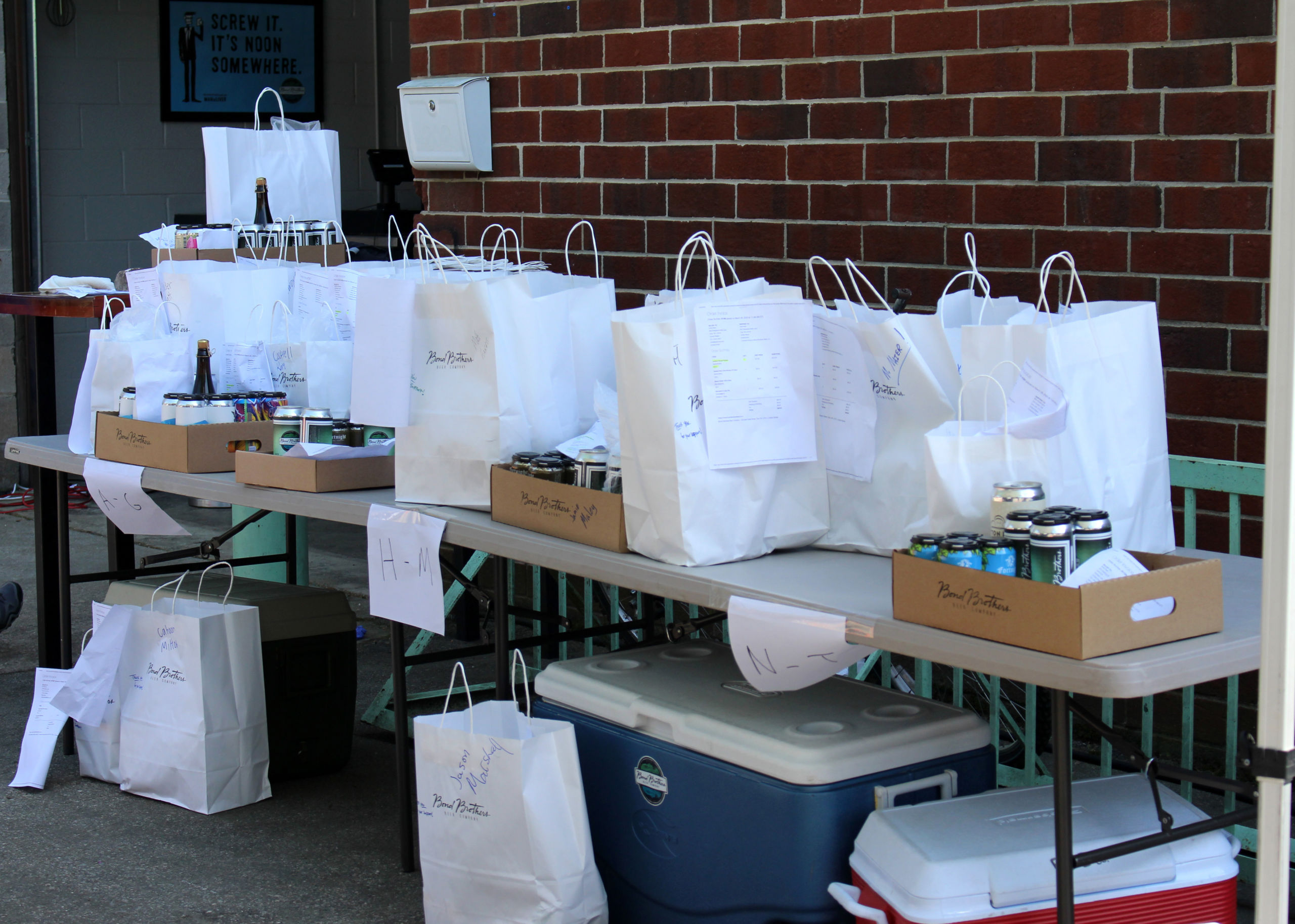
A patio at the side of the brewery, where on most nights and weekends it takes some skill to find a seat, is empty.
The COVID-19 pandemic and ensuing government orders on now-ubiquitous social distancing has thrown the global economy into panicked freefall. Restaurant workers were among the first layoffs, and even businesses deemed essential — with the exception of grocery stores — have laid off workers in droves.
Breweries, wineries, and liquor stores are classified “essential” under state and county orders to shelter and stay in place. But breweries have closed taprooms. Distillers’ tasting rooms are gone, for now. Same for wineries.
It’s creativity and innovation that led these entrepreneurs to pursue alcohol-related businesses in a state that, in some legislative and religious corners, can’t get past the sting of the 21st Amendment, some 90 years ago. Granted, laws governing alcohol in North Carolina have loosened over the years, especially for brewers and vintners. Even people making spirits, which wasn’t made legal here until 1979, were finally seeing a speckle of light in what was a long, dark tunnel.
Then this happened.
The N.C. Division of Employment Security was staffed for only 3,000 claims a week, spokesman Larry Parker told CJ. The agency reported receiving 195,661 March 16 through 8 a.m. March 26, roughly 88% related to COVID-19.
At the peak of the Great Recession, the office handled 100,000 claims a month.
A $2 trillion stimulus package was signed into law Friday.
The bill is the largest relief package in U.S. history and extends aid to many struggling Americans through direct payments and expanded unemployment insurance, the Wall Street Journal reported. “The package provides loans and grants to businesses, augments drained state coffers and sends additional resources to sapped health care providers.”
The mammoth stimulus could offer some — though probably not immediate — relief to businesses and workers. Now, we wait.
“Once the fine print has been read and sifted through, we’re hoping that we can just re-employ everybody and, you know, not lay anybody off,” Arnold said.
Work hasn’t stopped, and the beer will still flow.
“We are planning to brew,” Arnold said. “We’re running low on some cans, but we kind of foresaw what was going to happen two or three weeks ago. So, we held off on all our beers that were in the tank. We held off on putting them into any kind of package.
“At the moment, we’ve got two or three beers in the tanks waiting to be packaged, and they’ll probably just go straight into cans when our existing stockpile has gone down. If we have to brew, yes, we have the capability to brew. We’re just taking it like everybody else … taking it every day at a time.”
Jay Bond, along with his twin-brother Jeremy and Whit Baker, the brewery’s “flavor wizard,” started — with another investor — Bond Brothers, which, on most evenings, serves as the metaphorical heartbeat of downtown Cary.
Local support hasn’t wavered. The brewery, still, has limited some staff hours as it evolves in our new reality. Adapt and adjust. For example, when the brewery ran out of crowlers — 32-ounce sealed cans filled with fresh draft beer — it borrowed a machine to can pints.
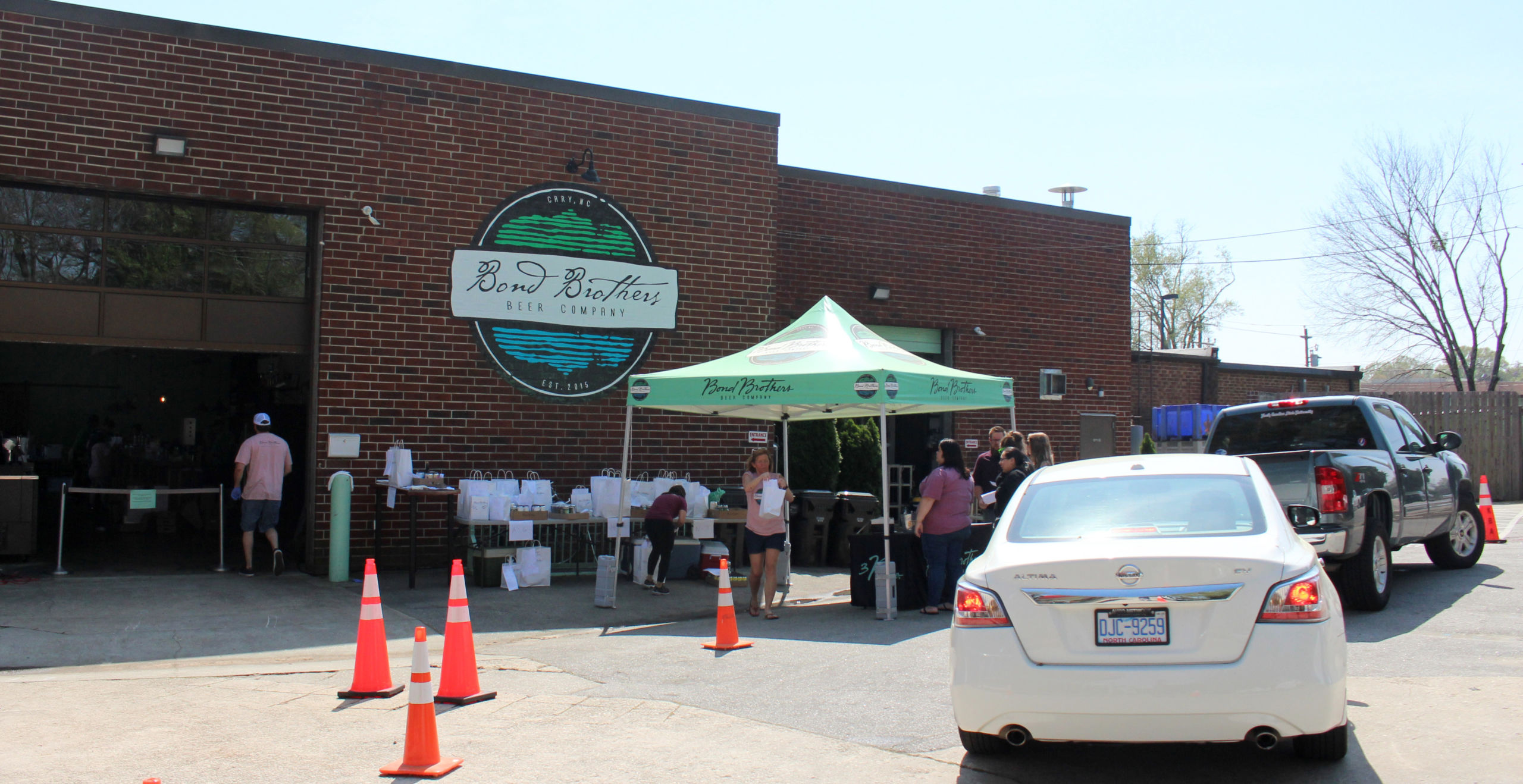
“We’re doing all we can to keep people busy and to get paid,” Jay Bond said. “It’s going as good as it can, given the circumstances. Each day we come up with new ideas and new ways to package. … ”
Stay home, stay safe
Mecklenburg County has ordered people to “stay at home.” In Buncombe County, officials call it “stay home, stay safe.”
N.C. Alcoholic Beverage Control stores remain open statewide, albeit with limited hours and strict rules for social distancing. Strict as in, “Don’t come inside, we’ll get it for you.”
Much of production for the state’s myriad distillers has pivoted. North Carolina distillers are still cooking, mashing, and, well, distilling. To a point.
Tasting rooms are closed, as are their shiny new cocktail bars, a result of Senate Bill 290, which the governor signed into law in July.
Curbside sales only go so far, and direct online sales aren’t allowed under N.C. ABC statutes.
The focus these days is on hand sanitizer, which, in addition to ethanol — high-proof alcohol — includes things such as glycerin and hydrogen peroxide.
Distillers can use the denatured alcohol — which can’t be consumed — for tax-free hand-sanitizing products, as long as it follows federal tax, and food and drug rules. The recent stimulus package is likely to bring distillers more economic relief.
Cultivated Cocktails Distillery in Asheville has made more than 2,400 gallons of sanitizer, including eight full totes, with seven more on the way.
“I’ve gone from running logistics on production and marketing to logistics on making sure the sanitizer reaches as many people as possible,” says the distillery’s Leah Pressley Howard.
In Charlotte’s LoSo neighborhood sits Doc Porter’s. Subdued, silent. Hip and happening, until just a couple of weeks ago. It’s a niche community stuffed with breweries, restaurants, and another distiller — Ollie Mulligan’s Great Wagon Road.
“Closing the tasting room really hurts us,” says Andrew Porter, who owns the business with his wife, Liz, both of whom have full-time jobs outside the distillery. “We get a lot of traffic, and a lot of bottle sales.”
Before the coronavirus.
“We closed even earlier,” he said, “because we wanted to make sure everyone was social-distancing properly, and we didn’t feel we could conduct tours and tastings adequately.”
The Porters, too, will turn to hand sanitizer, like many distilleries around the state — from Top of the Hill in Chapel Hill to Durham Distillery to Old Nick Williams in Lewisville to Outer Banks Distilling in Manteo. They’ll donate the bottle sanitizer — distillery logos and all — to paramedics, to health-care workers, to firemen, and to law enforcement. Whomever needs it.
Starting Monday, the Porters and two distillery workers will shift all production to hand sanitizer. Lowe’s home improvement stores, headquartered in nearby Mooresville, will cover their expenses for a month to make the sanitizer.
“We couldn’t do it without them,” Andrew Porter said.
The distillery can produce 50 gallons a week. He’s gotten some 200 requests for the products, which will go first to those with the most critical need.
“It’s an interesting time for sure,” Andrew Porter says. … We’re just trying to get our arms around it.”
Same goes in Mount Pleasant and Manteo. For Kinston, Winston-Salem, and Greensboro.
The distillery for Cultivated Cocktails is off a highway in a nondescript building in the Fairview community, on the outskirts of downtown Asheville, a mecca for brewing in North Carolina and, arguably, the United States.
The Howards — Leah and her husband, Taylor — opened a tasting room downtown, near the usually humming Grove Arcade. That now, of course, is closed for cocktails.
“That’s the hardest part for us. It’s beautiful here,” she said, referring to the gorgeous weather this past weekend. “Downtown Asheville would be crawling with people.”
Stay home, stay safe.
The distillery is running, too, currently working on a vodka and creme de cacao, both already listed by the N.C. ABC.
“We’ve been creative, figuring things out,” she said. “We’ll be fine … but I’m worried about a lot of our (N.C.) distillers.”
A different challenge
While distilleries and breweries struggle to adjust to the market under COVID-19’s economic ravages, beer and wine shops face challenges of their own.
Beverage stores that sell wine and beer are considered essential under both county and state stay-at-home orders — but store owners like Seth Hoffman, the proprietor of The Raleigh Wine Shop, were uncertain at first whether they’d be forced to close. Wake County ordered residents to stay home shortly before Gov. Roy Cooper announced a statewide shelter in place.
Both orders classify wine and beer shops as essential.
“It’s a relief,” Hoffman told CJ. But stores like his must adjust to the strain of uncertainty among customers. Wine tastings, in-shop classes, and friendly hugs between friends — all are things of the past. The Raleigh Wine Shop, and other local bottle shops like the Triangle Wine Company, Great Grapes, State of Beer, and Short Walk Wines, are serving up solutions to these challenges.
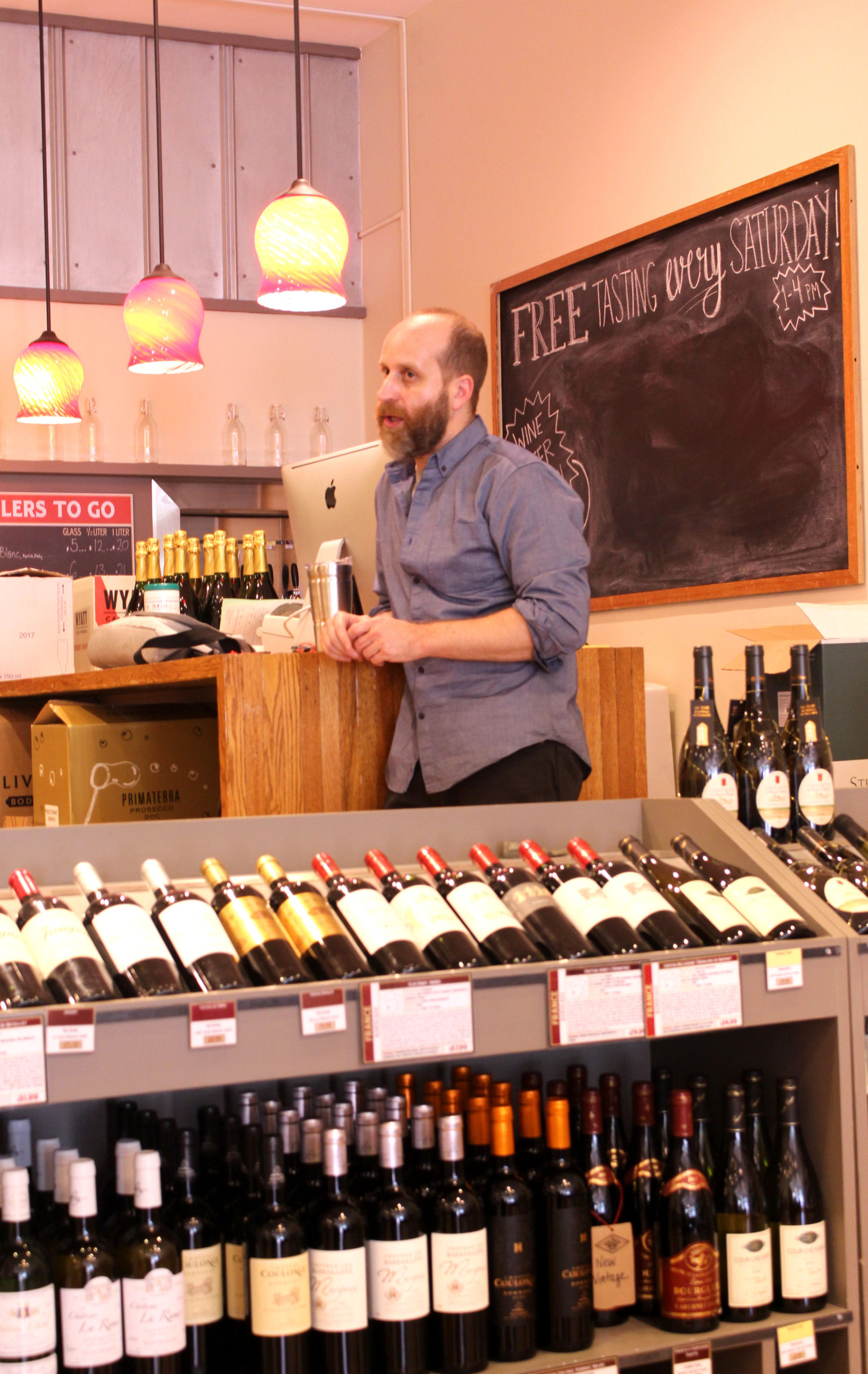
Hoffman, whose store offers regular tastings and wine classes to the posh, professional Glenwood South District in Raleigh, is working an online pop-up shop, selling wine to customers at a discount and offering curbside pickup and delivery.
Gene Salerno, owner of Cary’s Great Grapes, a homey beer and wine shop just off Kildaire Farm Road, is boosting online sales and offering free deliveries. Chris Roche, the owner of Triangle Wine Company, is buying as much product from small, local distributors as he can while promoting local beers and wines to every customer that walks through his doors at Cary’s Waverly Place.
“The little guys are getting slammed,” he told CJ. “We’re doing everything we can.”
Wine is social, Salerno said, and customers want some camaraderie as they stare down weeks of solitude with limited access to friends, family, and even neighbors. The Cary shop owner has poured wine for residents for 18 years. He greets customers by name. He has stories to tell about each bottle on his shelves.
“People want to come in and talk about wine,” he said. “I think it would be mutiny if people couldn’t have something to normalize their lives right now.”
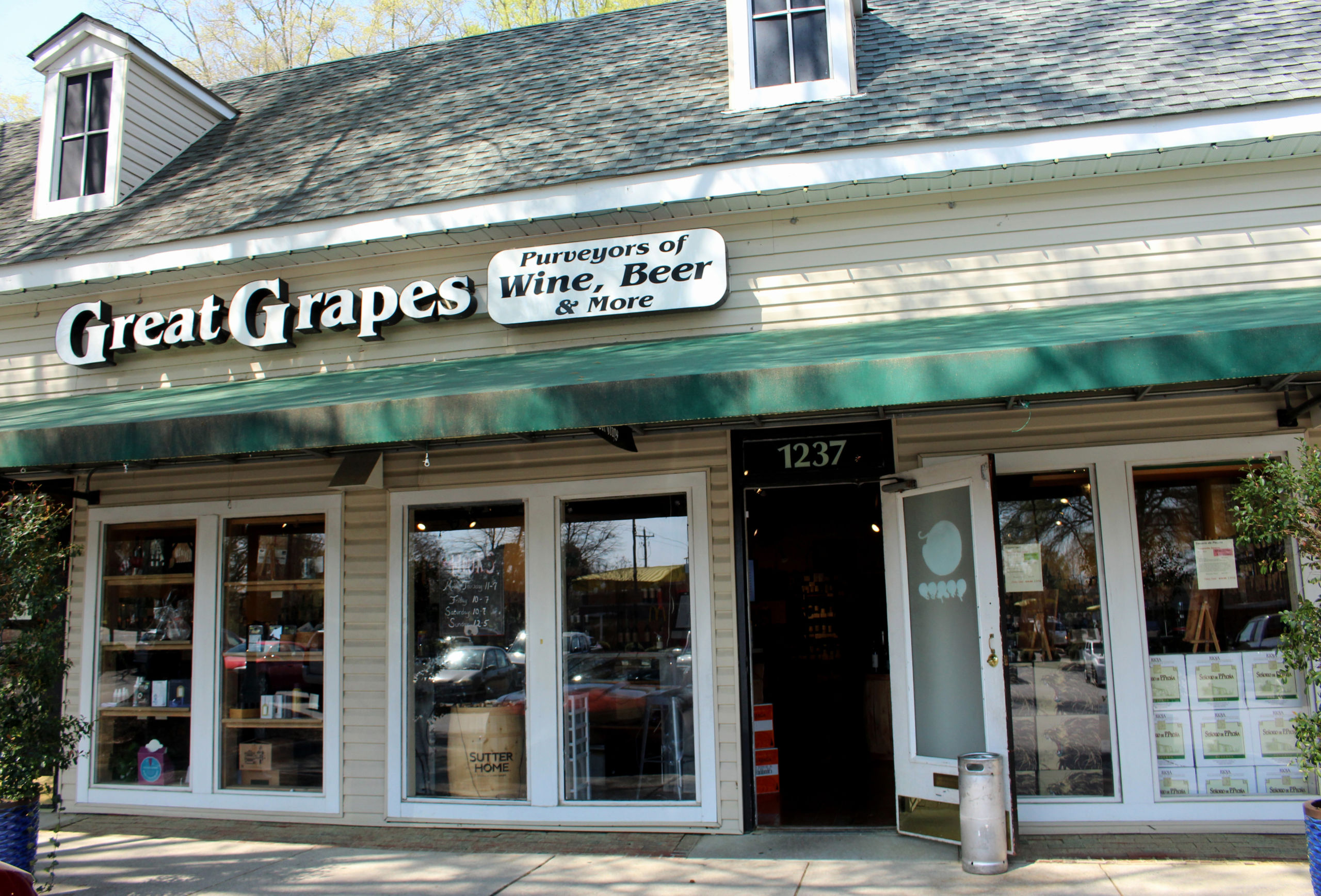
Hoffman is also inventing ways for customers to linger around a bottle while maintaining distance. The Raleigh Wine Shop will soon launch online wine classes, he said, similar to those formerly offered in his cozy store in the Glenwood South District. The only difference? Customers will join by video.
“People come into the shop, and you can just tell they really just want conversation with another person,” Hoffman said. His store allows customers inside, but limits the number to six.
It’s uncertain how the pandemic will change shopping trends for wine and beer in the future, or how a statewide stay-at-home order will affect purchases, store owners said.
But one thing is certain. All local stores are doing whatever they can to support one another through an uncertain time.
Hoffman, whose employees are bartenders and other hospitality workers whose jobs are temporarily suspended, is trying to give staffers more hours, not less. Roche and Salerno, too, are retaining as many employees as possible. Layoffs, however, are inevitable for many. The money only stretches so far, store owners said.
Regular customers are showing up. Online orders are trickling in. Bags of deliveries are carted from shops to homes. Still, these wine and beer sellers are feeling a slump in sales.
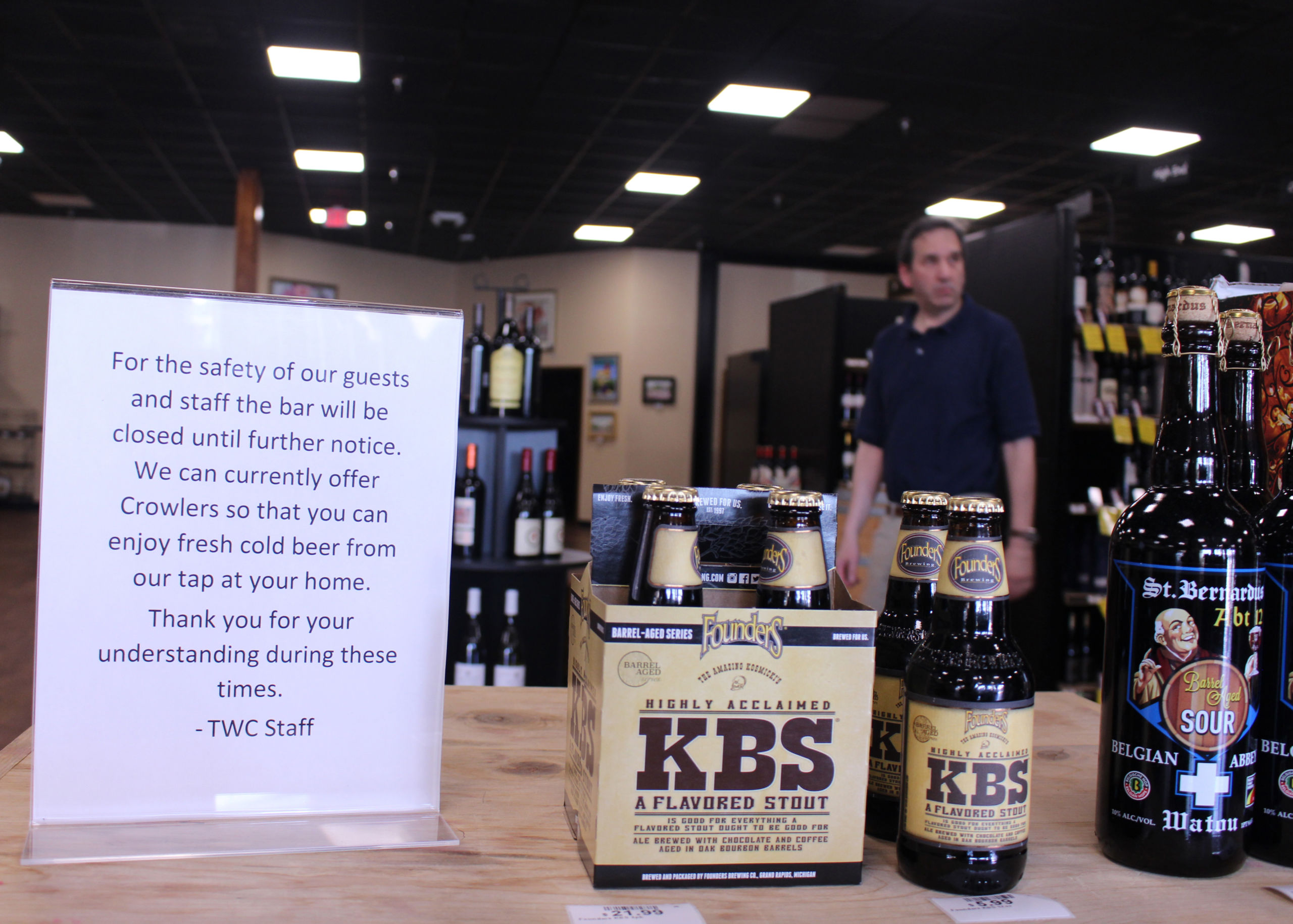
“It’s a tough time all around,” Roche said. He’d planned to open a new store in Raleigh this summer. Now, he’s not so sure.
What’s to come? No one knows. But the industry will adapt so long as it has customers to buy beverages and socialize from afar, shop owners said.
“People are looking for ways to self soothe, now more than ever,” Hoffman said. “We’re here to help, however possible.”
‘All the party but to go’
“All the party, but to go,” read a sign by the parking lot. More than 20 to-go bags and boxes spilled off a curbside table.
On March 28, Bond Brothers, along with Fortnight, Cotton House Craft Brewers, and Jordan Lake Brewing Co., sold beers via a “Local Brew Drive Through” event.
A line of cars stretched down Cary’s Cedar Street. Bond Brothers, closed for drinking on its patio and inside its brewery taproom, was very much open for business.
“I don’t even know how many orders we’ve filled today,” one frazzled employee said as she toted a bag of beers to an SUV in the drive-through line. At one point, that line was backed all the way up the street, she said.
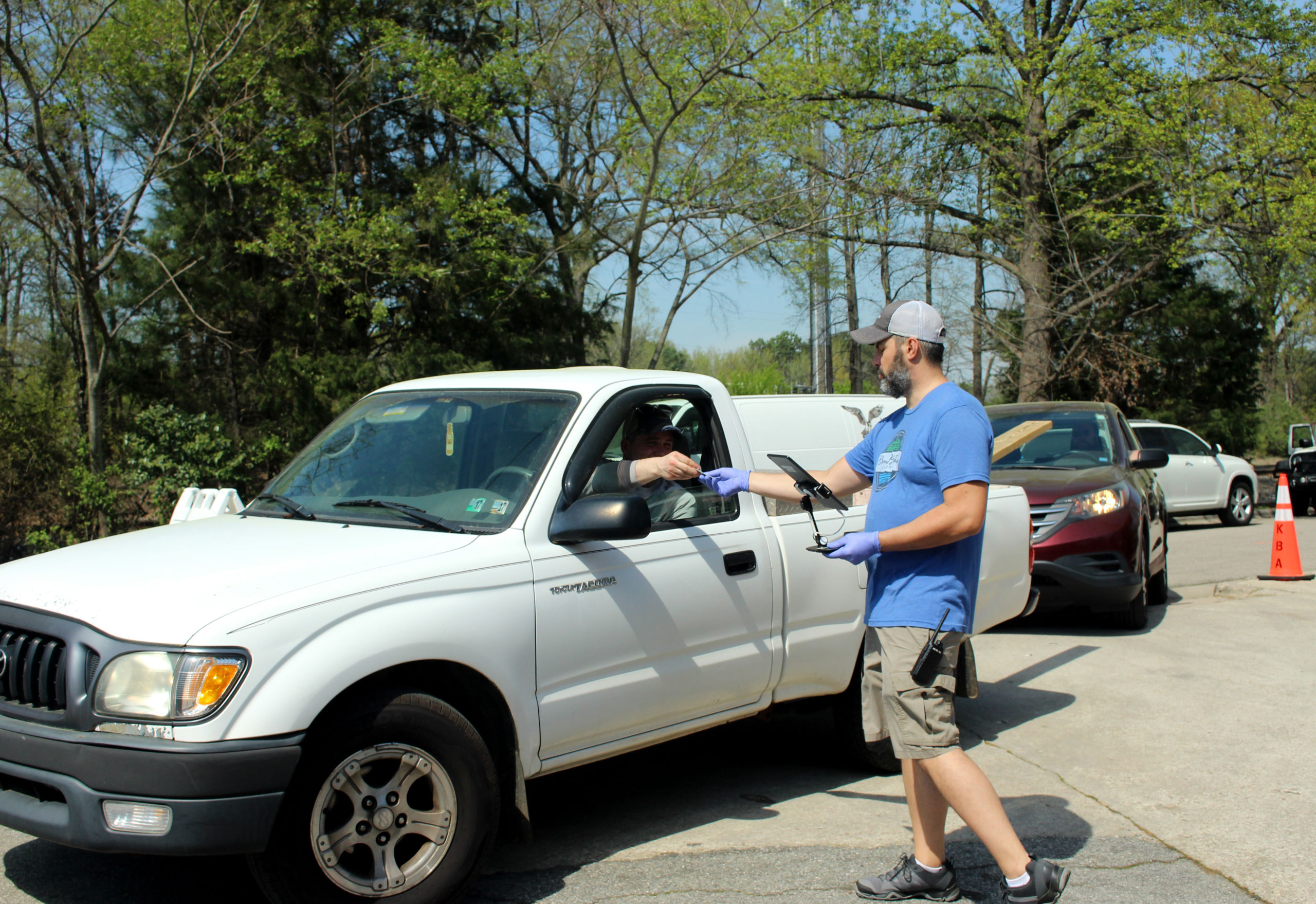
Anything to help the community. Anything to keep business flowing as steadily as the breweries’ ale supply, workers said.
Anything to keep the family together. Alcohol is their business, collectively. But it’s about much more than that.
“We got a lot of regulars coming in,” Fortnight’s Arnold told CJ. “We had one regular that came in yesterday, and she said, ‘I can’t believe I’m saying this in front of my daughter, but I realize now that this Fortnight was a family.’
“I guess that, just being locked at home brings that kind of stuff out in you, taking things for granted.”
“We even had people that don’t even drink beer come and buy beer,” says Josh Munck, a sales representative for Fortnight.
“That was yesterday,” he said Friday. “She was like, ‘I hate beer,’ and I was like, ‘Well, that’s all we have.’ She’s like, ‘I’m just gonna buy a couple of six-packs just ‘cause I feel bad.’ …”
Laura Eischen, the Bond Brothers’ “fun coordinator,” tells a story about how one regular stops by daily, if only to wave and say, “hi.”
Or, “I miss you.”
Small gestures matter, especially now.
“We decided to just keep the positivity,” Munck said. “That’s what you need, positive good energy, good karma … .”
“And,” Arnold interjected, “sanitation and cleanliness.”
They both laughed.
After all, the lights there remain on. Yet because of this virus, and governments’ reaction to it, way too many businesses in North Carolina — and the world, really — are left stumbling, grasping around in the dark.